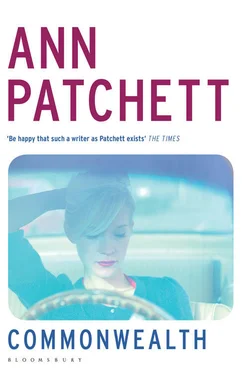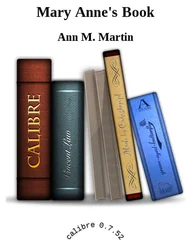“It’s me,” Albie whispered. “Get up.” He pointed to the bedroom door and then went out into the living room to wait for her.
Leo Posen had taken a house in Amagansett for the summer. There was no view of the ocean, a person would have to write an entirely different kind of book in order to afford an ocean view, but it was a beautiful house with wide halls and sunny rooms, a porch swing the size of a daybed, a kitchen with an enormous table that looked like it had been pegged together by Pilgrims to celebrate a later, more prosperous Thanksgiving. The house belonged to an actress who was shooting a movie in Poland for the summer, and summer was the only time she used it. The real estate broker had made it clear that this property was never rented, but the actress was a great admirer of Leo’s. In fact, she was hoping for a part in the movie of Commonwealth. She wanted to play the doctor who was having the affair, and hoped that Leo, surrounded by her pretty things, her pictures, would think of her.
In the spirit of full disclosure, Leo told the broker there was no movie deal.
The broker was stopped by this. Even she, who knew next to nothing about the movie business, knew that the rights should have been snapped up before publication. For the briefest instant she wondered if the option for Commonwealth was something she herself could acquire. “Don’t worry about that,” the broker said. “When they do make the movie she’s still going to want the part.”
Leo had rented the house in hopes that he would spend the summer working on a new novel, the one his literary agent had sold to his publisher without so much as an outline while Commonwealth was ringing the slot machines. He had also rented the house in hopes of pleasing Franny. He’d told her she wouldn’t have to do anything but lie on the big down sofa in the front room and read all day, or she could ride her bike to the beach and read. “Sand, waves, beach roses,” he said, picking up a strand of her fascinating hair and letting it fall between his fingers. At night after dinner they would sit together on the porch and he would read her everything he’d written that day. “That doesn’t sound like such a bad vacation.”
But it was a bad vacation. The problem, they realized much too late, was the glorious house itself, which sat atop a hill to catch the afternoon breeze while a great hedge surrounded the property for privacy. The fruit trees scattered over the wide lawn had been late to bloom because of the long, hard winter, so that even now in early June the cherry trees were weighted with dark pink blossoms. The jumbled flower beds that spoke of glorious disarray were tended by a gardener who came on Wednesdays, the same day a Peruvian man with a skimmer net came to remove the cherry blossoms from the swimming pool. There were five bedrooms with variations on the sloping-ceiling-dormer-window theme: window seats, puffy comforters, hand-braided rugs over floors of quarter-sawn oak. Leo Posen had told the broker that he was looking for something considerably smaller but she dismissed the idea. “Smaller will still be more expensive because of the deal you’re getting,” she told him. “You cannot imagine what this house would cost you if you were renting at fair market value. If you don’t want to use the extra rooms I suggest you close the doors.”
That might have solved the problem were it not for the fact that nature abhors an empty bedroom in summer in Amagansett, especially when those rooms are owned by an actress and rented by a novelist. People wanted to visit. Eric, his editor, who should have been the one to hire a sentry to patrol the property line with a gun, was the first to call and say how nice it would be to get together outside of the city and talk over Leo’s ideas for the new book. Eric could come out Thursday, beating the rush, but Marisol, his wife, had an opening she needed to go to that night. He supposed that Marisol would have to brave the Jitney on Friday.
Marisol? Leo stumbled for an instant but then agreed pleasantly to everything — yes, yes, a great time would be had by all. He hung up the phone and looked at the yellow legal pad in front of him, then he looked out the window. It was raining, and for a while he sat and admired the cherry trees, wondering if anyone had ever made a legal pad out of a cherry tree. Then he went downstairs to see if Franny thought they should drive into town for lunch.
“It’s good that Eric’s coming,” Leo said to Franny. The rain was light and they sat outside under an awning at the café where they’d had lunch three days in a row. It was extremely pleasant. “I can ask him about finding you a job. You’re a terrific editor, you know, better than he’ll ever be, not that I’d mention that.”
Franny shook her head. “Don’t ask him.”
The waitress came by and Leo touched the rim of his empty wineglass. It was after two o’clock, a very late lunch. “If I don’t ask him he’ll figure it out himself. I might just mention that you’re looking for something. Or maybe I’ll mention it to Marisol.”
“Eric knows me,” she said. “If he wants to hire me he knows where I am.” Of course, Eric had probably noticed that Leo and Franny didn’t live in New York, and in fact didn’t live anywhere for more than four months at a time, which would make taking on a regular job difficult. Anyway, Franny wasn’t sure she wanted to be an editor.
“Eric knows you from dinner parties. He hasn’t gotten to spend any real time with you. That’s why this is going to work out so well.”
When Eric came on Thursday afternoon he said he’d rather stay in for dinner. He’d been out every night that week, and anyway it would be so much easier to talk at the house. Eric was in every sense a wiry man, a runner with a small frame who must have once been told that blue complemented his eyes. Franny had never seen Eric in anything other than blue. He looked up the staircase, touching the banister with affection.
Leo looked at Franny. “That would be all right, wouldn’t it?”
She should have seen it right then but she didn’t. She was thinking in terms of one dinner, one night. Franny went into the kitchen and called Jerrell at the Palmer House to ask him how to cook steaks. He would just be at the beginning of his shift now. He would be chopping parsley.
“Little House,” he said. “Get the fuck back here. You know can’t nobody else fill my cup.”
She laughed. “I’m going to give up my summer to go get your lemonade at the bar? Be a friend and help me here.”
Jerrell was standing in the manager’s office and the manager was staring at him. The cooks never got calls. He told her to rub a little bit of Old Bay on the meat and let it sit. “I mean a little bit. That shit is not for steaks.” Then he walked her through the basics of asparagus and baked potatoes. “You buy the salad and a cake. Somebody out there’s got money. Don’t you go doing everything yourself.”
Franny went to the grocery store, the butcher’s, the bakery. She went to the liquor store and picked out the wines, stocked up on scotch and gin. When she got back to the house she unloaded the car. Leo and Eric had begged off the trip to town, saying they were going to talk about the novel first, get business out of the way. She could hear them laughing out on the screened porch on the side of the house where Leo had decided it would be all right to smoke. Great, raucous laughter. Franny carried out two glasses of ice and a bottle of Macallan to be friendly. She was wearing her beach clothes: cut-off shorts and flip-flops, a plain white T-shirt. She was twenty-nine years old. They were playing house. She was playing hostess.
“Eric, will you look at this girl?” Leo said from his chair, putting his arm around her hips and pulling her towards him. “Is she a dream?”
Читать дальше
